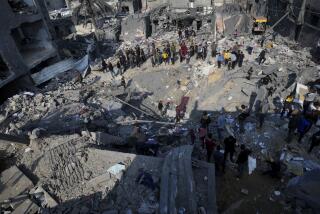Iraq Says It May Stop Destroying Missiles
- Share via
BAGHDAD — After Iraq crushed six more Al-Samoud 2 rockets Sunday, the scientific advisor to President Saddam Hussein said the nation’s “painful” decision to destroy the missile system was added proof that Baghdad is complying with every concern of the U.N. Security Council, leaving no reasonable grounds for war.
Gen. Amir Saadi, the top Iraqi official dealing with U.N. weapons inspectors, sounded weary and embittered, complaining that nothing the country has done so far has made any impression on the United States or Britain. Those two nations say Baghdad has refused to give up weapons of mass destruction, as demanded by the United Nations, and are massing troops on Iraq’s borders for a possible military campaign.
Saadi warned that if Washington stops working through the United Nations, Iraq might as well halt its destruction of the missiles, which he said would be “quite useful” for defense in a war.
“If it turns out during an early stage this month that America is not going the legal way, then why should we continue?” asked Saadi at his meeting with journalists.
He said President Bush and British Prime Minister Tony Blair keep repeating that Iraq has hidden weapons of mass destruction but offer no proof.
“This steady drumbeat of lies upon lies is all we hear these days,” he said. “They are sending their soldiers thousands of miles to fight people who are not threatening them, just living in their houses in peace. It is a war driven by greed and nothing else.”
Saadi said that inspections are working, that they are a far cheaper alternative to war in money and blood, and that Iraq is being proactive in trying to explain discrepancies and questions raised by U.N. inspectors.
Iraq used bulldozers to crush four Al-Samoud 2 missiles Saturday, meeting a deadline imposed by chief U.N. weapons inspector Hans Blix. With six more crushed Sunday as inspectors looked on, Iraq has disposed of 10 of the long, thin missiles out of about 120.
Saadi said only four to six could be destroyed in a day, especially because about half the missiles are equipped with warheads and filled with highly toxic liquid fuels, making them hazardous to handle and disarm.
The destruction is taking place at the Taji military complex north of Baghdad, the Iraqi capital, but reporters have not been allowed to watch.
Saadi said Baghdad has been trying to prevent images of the procedure from being shown in the nation’s mass media because many Iraqis would be hurt to see the medium-range missiles being eradicated because of a U.N. judgment that Iraq considers motivated by U.S. pressure. On Sunday, government-controlled newspapers ignored the start of the missile destruction on their front pages, and some did not mention it at all.
Showing the missiles being destroyed “would be in the interest of Iraq” internationally to underline Baghdad’s obedience to U.N. directives, Saadi said. “But from previous experience, we know such pictures would be painful to the Iraqi people,” he added.
In addition to destroying the missiles, Iraq has sent letters to Blix detailing new discoveries and explanations to address problems voiced by inspectors, who returned to Iraq in November after a four-year absence.
“Practically all the areas of concern ... have been addressed,” Saadi said.
Inspectors have been seeking proof that Iraq unilaterally destroyed stockpiles of chemical and biological weapons and their precursors during the summer of 1991, as it claims.
On Sunday, U.N. technical experts met with Iraqi officials to hear their proposals for analyzing the purported dumping sites to prove the nature and quantity of weapons destroyed there.
Teams of inspectors returned Sunday to one site, Al Aziziya, an abandoned helicopter airfield and weapons testing range 60 miles southeast of Baghdad, where Iraq says it destroyed R-400 aerial bombs filled with biological agents in 1991. Saadi said Iraq blew up 157 bombs containing anthrax, aflatoxin and botulinum toxin. During excavations, Iraq found eight bombs intact -- meaning that inspectors can analyze their contents to corroborate Baghdad’s claims.
Saadi said Iraq also destroyed 1.5 tons of the nerve agent VX at another location and hoped that excavations could prove that claim as well.
U.N. inspectors have also been concerned about the continuing reluctance of Iraqi scientists to submit to private interviews on Baghdad’s biological and chemical programs. On Saturday, four scientists were invited to be interviewed, but only one meeting succeeded under inspectors’ ground rules, which require that talks take place in private with no tape recorders.
More to Read
Sign up for Essential California
The most important California stories and recommendations in your inbox every morning.
You may occasionally receive promotional content from the Los Angeles Times.









